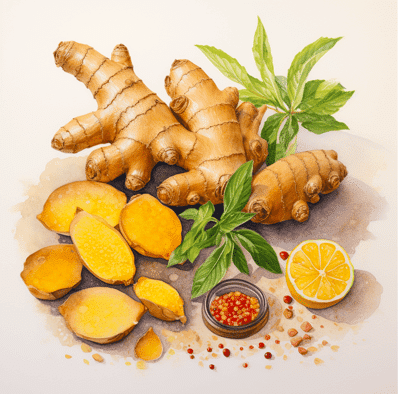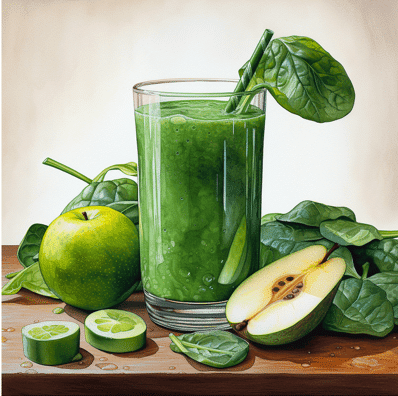
Does the liver cause acne?
Your liver health can significantly impact your skin, with poor liver function potentially contributing to acne. By embracing a plant-based diet, exercising regularly, managing stress, and ensuring adequate sleep, you can support liver health and consequently improve your skin’s condition. Remember, achieving clear skin is about more than just external treatments, it involves nurturing your body from the inside out.
ABOUT ME
Be beauty. Be plant-based!
As a former Registered Nurse and avid plant-muncher, I’m in love with how simple plant-based foods make it easy to be beautiful.

Have you read?
Skin Agony: Does Endometriosis Cause Acne?
Does Collagen Hold the Key to An Acne-Free Life?
In the dimly lit quiet of her apartment, Nadia sat hunched over her laptop, the glow of the screen illuminating the worry etched across her face. The term “Does the liver cause acne?” stared back at her from the search bar, a result of countless hours spent trawling through the internet, trying to pinpoint the mysterious cause of her stubborn acne. The vibrant, charismatic woman that she once was, seemed a distant memory, slowly retreating behind the looming shadows of insecurity and self-doubt. She was desperate to regain her former radiance, but it felt like a puzzle missing a few crucial pieces.
One day, while reading a blog post, a new idea took root. The author spoke about the connection between liver health and skin conditions, shedding light on the potential role of a poorly functioning liver in exacerbating acne. While Nadia had always strived for a balanced diet, she hadn’t considered the significant influence her food choices could have on her liver health.

Embracing this new perspective, Nadia began to restructure her diet, opting for more plant-based foods rich in antioxidants and fiber. She filled her plates with colorful salads, whole grains, and fruits, and became fond of her morning ritual of a green smoothie. These dietary changes, though small and gradual, began to make a noticeable difference. Not only did she feel lighter and more energetic, but her skin also started showing signs of improvement.
However, Nadia knew that a holistic approach was needed for lasting change. She began incorporating regular yoga sessions into her routine, relishing the relaxation and increased blood flow it brought. The stresses of her demanding job no longer consumed her. Instead, she found solace in her evening meditations, breathing exercises, and the soothing pages of her favorite books. This shift in her mindset began to mirror on her skin, slowly but steadily reducing her acne breakouts.
Months passed, and one day, as Nadia looked at her reflection, she could hardly believe the transformation. Her skin glowed with a radiance that she hadn’t seen in years. The persistent acne had receded, replaced by a clear, bright complexion. She felt a surge of joy and confidence – she had reclaimed her vibrancy, her glow, and most importantly, her sense of self.
Nadia’s journey was not just about clearing her skin, but also about rediscovering her inner radiance. Through dietary and lifestyle changes, she had not only addressed her acne but had also revitalized her liver health. The phrase ‘liver cause acne’ that had once consumed her thoughts was now a reminder of her triumphant journey towards wellness, self-care, and regained confidence. A journey that started with worry and self-doubt but ended in radiant skin and a healthier, happier Nadia.
For centuries, ancient wisdom has drawn connections between the health of our internal organs and the vitality of our skin, the body’s largest organ. Today, modern science increasingly supports these links, particularly between the liver – your body’s primary detoxifier – and your skin health. As a busy woman juggling countless tasks, you might have noticed the toll it takes on your body, reflecting in your health and beauty. It can be a challenge, but every goddess has her secret weapons. One of yours? The power of understanding the connection between your liver and skin.
The Liver-Skin Connection
In the heart of this intricate bodily ecosystem lies your liver, a tireless worker responsible for over 500 vital functions. Among them, detoxification takes a center stage role, filtering out toxins from your blood that can impact your health. An essential process, indeed, but what happens when things go wrong? What happens when liver damage occurs or its function dwindles? That’s where skin problems come into play, acne being a primary culprit.
Imagine your skin as a canvas, reflecting the internal state of your body. When your liver is overwhelmed by toxins or is functioning poorly, it could lead to an accumulation of toxins in your body. These excess toxins might then find an alternative exit route – your skin. Consequently, this could manifest as various skin issues, including acne, as your skin tries to expel the overload of toxins. It’s not that an ailing liver directly causes acne; it’s the fallout of the disruption in the body’s natural detoxification process that can indirectly contribute to skin woes.
Further complicating things, the liver plays a vital role in hormone regulation. Any imbalance, such as those caused by liver problems, can lead to hormonal acne. Suddenly, those uninvited acne breakouts seem a little less mysterious, don’t they? That’s why maintaining a healthy liver can be an essential step towards the quest for clear skin and overall health.
The good news? You have more control over this than you might think, and it all starts with what you put on your plate.
Spice Up Your Skin Health: The Ginger-Liver Connection
In your journey towards radiant skin and exceptional health, one of your most powerful tools lies right in your kitchen. Enter ginger, the humble root with a zesty bite. You’ve likely known it as a trusty ingredient in your kitchen, but there’s more to ginger than just its distinct flavor. It turns out, this fiery spice could be your ticket to better liver health, and subsequently, clearer skin!

In the scientific community, ginger has been creating quite a buzz. Studies show that individuals who consume more ginger tend to have lower obesity rates. Now, we might be tempted to pass this off as ginger simply being part of a healthier, less Westernized diet. However, this isn’t the whole story.
When put to the test in a randomized controlled trial, participants who sipped on a hot ginger beverage (think a teaspoon of ginger powder in hot water) reported feeling less hungry afterwards. But the benefits weren’t just in their heads; their metabolic rate was also elevated four hours post-ginger. This could mean that ginger helps as a healthy body weight is an important factor for good liver health.
The real proof, however, is in its impact on liver health and body weight. A twelve-week study found that daily doses of ginger significantly reduced participants’ body mass index. Furthermore, the liver health improved for the participants. There was a decrease in inflammatory markers, improved liver function tests, and a reduction in liver fat.

Try these Cashew and Ginger Energy Balls at Veggilicious
What does this have to do with acne? Well, liver health is directly linked to your skin’s condition. A happy, healthy liver is more efficient at eliminating toxins from your body. And as we know, fewer toxins mean fewer potential triggers for those dreaded acne breakouts.
Plus, let’s not forget the other direct benefits of ginger for your skin. It’s packed with antioxidants that protect your skin from free radical damage. And for the ladies out there, it’s an excellent natural remedy for period pain. Reducing those aches might just help curb your chocolate and ice-cream cravings, and we all know what a sugar binge can do to our complexion!
So, go ahead and spice up your life with a dash of ginger. It’s a simple, plant-based addition to your diet with potential health benefits galore, particularly for your liver and skin. This root could be the key to helping you feel more attractive, inside and out.
You might also like:
Plant-Based Perks: Weight-Loss Made Easy
The Nutty Truth: Munch More, Weigh Less!
Embracing a Plant-Based Diet for Liver and Skin Health
Beyond the power of ginger, your diet, particularly a plant-based one, plays a significant role in promoting liver health and, by extension, clear skin.
Science shows us that a well-rounded, plant-based diet can be incredibly beneficial for your liver. Rich in antioxidants, fiber, and healthy fats, it can help reduce inflammation, aid in digestion, and support the liver’s detoxification process. Wondering how this ties to acne prevention? When your liver is functioning at its best, it’s more effective in filtering out the toxins that, when accumulated, can contribute to acne breakouts.

Let’s explore some superstar plant foods for liver health. Cruciferous vegetables like broccoli and Brussels sprouts have been shown to increase the liver’s natural detoxification enzymes, promoting good liver health. Beets can help naturally cleanse the liver, and leafy greens protect it from environmental toxins. What’s more, all these foods are high in fiber and low in sugar, helping to balance your blood sugar levels – another factor that can play a role in acne breakouts.
You might be thinking, “This sounds wonderful, but does it work?”. Yes! For the real-deal science, you can nerd out with this evidence-based video on broccoli and liver health at the highly reputable NutritionFacts.org, narrated by the ever-funny Dr Greger.
But even better, why worry about the evidence when eating brocolli can taste great? Try this tasty:
Garlic Broccoli Stir-fry with Chickpeas at Elavegan
In essence, every bite you take is an opportunity to nourish your body. By embracing a plant-based diet, you can fuel your liver with the nutrients it needs to thrive, leading you one step closer to your goal of radiant, clear skin.
Easy Liver-Friendly Foods
In the bustling rhythm of your day-to-day life, you may wonder how to incorporate these liver-friendly foods without spending hours in the kitchen. No worries, we’ve got you covered with simple, easy-to-prepare, plant-based meals that can seamlessly fit into your busy lifestyle.
Kickstart your day with a refreshing smoothie loaded with spinach, avocado, and a touch of apple for sweetness. It’s a quick, nutrient-dense option for breakfast that gives your liver a helpful boost first thing in the morning.

For lunch, how about a quinoa salad brimming with crunchy veggies like broccoli, Brussels sprouts, and beets? You could even add a squeeze of lemon for a tangy twist and an extra dose of liver-friendly antioxidants.
When the afternoon hunger pangs hit, reach for a handful of nuts and seeds. They’re packed with healthy fats that promote liver health, and they’re perfect for a quick, on-the-go snack.
For dinner, a hearty bowl of mixed greens with a side of roasted sweet potato can make a satisfying meal. It’s light, easy to digest, and provides a variety of nutrients to support your liver’s night-time detoxification process.

Of course, don’t forget the crucial role of hydration. Maintaining a good intake of water throughout the day helps your liver function at its best and is essential for clear, glowing skin.
Remember, incorporating liver-friendly foods into your daily meals doesn’t have to be complicated. With a bit of creativity, you can create delicious meals that nourish your liver, support your skin health, and perfectly suit your busy lifestyle. Now that’s a win-win situation!
Other Lifestyle Changes for Your Liver and Acne
While diet is a significant piece of the puzzle, there’s more to the liver and skin health equation. Let’s take a look at some other lifestyle changes you can make to support your liver function, boost your skin health, and add more glow to your busy life.
Regular exercise is one of the most effective ways to maintain good liver health. When you engage in physical activity, it enhances blood flow, helping your liver to process and remove toxins more effectively. Plus, breaking a sweat can open up your pores and give your skin a natural, healthy glow.
Stress management is another crucial aspect of liver and skin health. When you’re under stress, it can negatively affect your liver function and disrupt your blood sugar levels, leading to skin issues like acne. So, take a few moments each day to do something you enjoy – read a book, meditate, dance to your favourite song, or simply take a few deep breaths. A little self-care goes a long way in maintaining your liver health and achieving clear skin.
Lastly, don’t underestimate the power of a good night’s sleep. During sleep, your liver works hard to detoxify and repair your body. Adequate sleep not only ensures your liver can perform these tasks optimally, but it also helps to rejuvenate your skin, making it look fresher and brighter. Moreover, a healthy sleep routine can support your blood clotting mechanisms, which is crucial for good liver health.
In essence, your lifestyle plays a huge role in maintaining your liver health and achieving clear skin. By incorporating regular exercise, managing stress, and ensuring you get plenty of sleep, you’re well on your way to looking and feeling your best, inside and out.
How Liver Health Relates to Overall Health
While your quest might be focused on achieving clear, glowing skin, it’s worth noting that maintaining good liver health goes beyond skin deep. Your liver is an extraordinary organ, tirelessly working to keep your body in balance and prevent health problems.
This vital organ is like a chemical processing plant and a powerhouse cleaner all in one. It filters your blood, breaking down harmful substances which your body then expels or reuses. It helps in regulating blood sugar levels, synthesizing proteins, and producing bile to aid digestion. Finally, the liver plays a crucial role in blood clotting and also helps to process and store nutrients from the food you eat.
When you take care of your liver, you’re not just supporting clear skin or warding off skin conditions like dry skin or liver spots. You’re also aiding in maintaining your overall wellness and vitality. For instance, by managing liver diseases like non-alcoholic fatty liver disease, you can avoid potential complications such as cirrhosis, liver cancer, and even cardiovascular disease.
So while you’re embracing a plant-based diet or incorporating lifestyle changes to better your skin, remember: you’re also significantly enhancing your overall health and wellness. In the end, it’s a beautiful journey towards a healthier, more vibrant you!
Liver Health and Other Skin Conditions
Have you ever noticed liver spots and wondered what they actually signify? Often appearing as small, dark areas on your skin, these spots have little to do with the liver. Their name originates from a time when they were associated with liver problems, which we now know isn’t the case. However, it’s an interesting example of how our skin can be a mirror to our internal health, reminding us to pay heed to our body’s whispers before they turn into screams.
Now, let’s delve into a more substantial connection between the liver and the skin: non-alcoholic fatty liver disease (NAFLD). A condition caused by an excess of fat in the liver, NAFLD can be a silent but significant contributor to skin conditions. Here’s how: NAFLD is known to increase systemic inflammation, which can exacerbate skin issues. Though it might not directly cause skin changes, managing NAFLD is an important aspect of maintaining skin health.
Notably, poor liver function can also lead to dry skin. If the liver isn’t working optimally, it can affect the regulation of bile, which helps the body absorb fat-soluble vitamins – one of them being Vitamin E. This vitamin is crucial for skin health, helping to maintain skin’s hydration and elasticity. So, a liver struggling with its many duties can indirectly contribute to dry skin and other skin conditions.
The hidden link between liver health and skin conditions underscores the importance of taking care of this vital organ. Remember, a happy liver often equals happy skin.
Conclusion: Does The Liver Cause Acne?
There you have it – the extraordinary journey that ties your liver health to your skin health, offering you a new perspective on your quest for beauty and wellness. Remember, your skin is a reflection of your internal health, and your liver is a star player in this dynamic.
Eating a plant-based diet rich in liver-supportive foods, keeping active, managing stress, getting enough sleep, and caring for your liver can set you on a path towards clear skin and vibrant health. After all, true beauty stems from a holistic approach to well-being, and every small step you take towards maintaining your liver health is a step towards the radiant, plant-based goddess you are.
Let’s embrace this journey, celebrate every step, and remember – when we glow from within, it truly shows on the outside. So, keep shining, keep glowing, and keep nurturing your health from the inside out.
FAQ: Does the Liver Cause Acne?
We’ve covered a lot of ground, and it’s time to tackle some frequently asked questions. These will further clarify the connections to show does the liver cause acne.
1. Can problems with the liver cause acne?
While liver problems don’t directly cause acne, they can exacerbate it. A distressed liver may struggle to filter out toxins effectively, leading to their buildup which can aggravate acne.
2. Can liver problems cause skin problems?
Yes, liver problems can cause skin issues. For instance, liver diseases can lead to jaundice, itchiness, and spider angiomas. They can also increase the risk of skin cancer due to the liver’s reduced capacity to detoxify carcinogens.
3. Does liver detox cause acne?
During a liver detox, your body expels toxins, some of which might be pushed out through your skin, potentially leading to temporary acne breakouts. This doesn’t happen to everyone and is usually a short-term effect.
4. How do you detox your skin from liver?
By maintaining good liver health, you’re essentially helping to detox your skin. A balanced, plant-based diet, regular exercise, and adequate hydration can all support your liver function and, consequently, skin health.
5. How do you get rid of liver acne?
“Liver acne” isn’t a recognized medical term, but if you’re referring to acne potentially linked to liver health, adopting a plant-based diet, staying hydrated, exercising, and maintaining a good skincare regimen can help. If your acne persists or worsens, consider seeking medical advice.
6. Where is liver acne located?
There isn’t a specific type of acne called “liver acne,” so it doesn’t have a distinct location. However, hormonal imbalances due to liver issues can contribute to acne, often appearing on the face, chest, and back.
7. Can liver function tests diagnose skin conditions?
Liver function tests, which measure the levels of liver enzymes and other substances in your blood, can detect liver diseases but not directly diagnose skin conditions. For skin-related concerns, doctors may use other diagnostic methods such as a skin biopsy.
8. Can high blood pressure affect my liver and skin health?
Yes, long-term high blood pressure can damage your liver cells, impairing liver function. This can indirectly affect your skin health, potentially leading to issues like acne. High blood pressure can also cause certain skin problems, like flushing or spontaneous bleeding into the skin.
9. How do fatty acids in my diet affect my liver and skin health?
Certain fatty acids, particularly omega-3s, have anti-inflammatory effects which can benefit both your liver and skin. However, a diet high in saturated and trans fats can contribute to liver diseases, like non-alcoholic fatty liver disease, and exacerbate skin conditions such as acne vulgaris.
10. Can blood tests determine the health of my liver and its impact on my skin?
Yes, certain blood tests can provide insights into your liver health. These include tests for liver enzymes, which can indicate liver damage, and bilirubin tests, which might show problems with the liver’s ability to process this byproduct of red blood cell breakdown. However, these tests do not directly correlate with skin health. For skin concerns, dermatologists typically rely on physical examination and your medical history. If you suspect liver-related skin issues, it’s best to consult both your primary care physician and a dermatologist.
11. Can liver damage cause severe acne?
Liver damage doesn’t directly cause severe acne. However, when liver function is impaired, it can lead to toxin buildup in the body. This, in turn, can exacerbate skin conditions, including acne. Also, a damaged liver can affect hormone regulation, potentially leading to hormonal acne.
12. Is it true that good liver health can help maintain blood sugar levels and reduce acne breakouts?
Yes, the liver plays a significant role in regulating blood sugar levels. It processes glucose for instant energy and stores excess glucose for later use. Imbalanced blood sugar levels can lead to inflammation, contributing to acne breakouts. So, maintaining a healthy liver indirectly helps control acne.
13. Can a plant-based diet cure liver diseases?
While a plant-based diet can’t “cure” liver diseases, it can definitely support liver health and aid in the management of liver conditions. Plant foods are rich in antioxidants and anti-inflammatory compounds, which can help reduce inflammation in the liver. They’re also high in fiber, which aids digestion and helps maintain a healthy weight, reducing the risk of non-alcoholic fatty liver disease.
14. How can I maintain the surface of my skin while promoting liver health?
The health of your skin and liver are interconnected. By maintaining a balanced, plant-based diet, staying hydrated, and practicing good skincare hygiene, you promote liver health and the natural radiance of your skin. Also, remember to keep stress in check and get enough sleep, as these factors can affect both your liver function and skin health.
Unraveling the links between your liver health and skin health helps you see your health journey in a new light. As you strive for clear, glowing skin, remember that you’re also nurturing your body as a whole, enhancing your overall well-being.
FAQ: Traditional Chinese Medicine (TCM) on the Liver and Acne
1. How does TCM view the connection between the liver and acne?
In TCM, acne is often linked to heat and dampness in the body, and the liver plays a significant role in maintaining this balance. It is believed that a stagnation of liver energy (or “liver qi”) can result in heat and cause skin issues like acne.
2. What is ‘liver qi stagnation’?
Liver qi stagnation in TCM refers to an imbalance or blockage in the flow of ‘qi’ or vital energy, often associated with emotional stress or improper diet. This stagnation can lead to an overproduction of sebum and subsequent acne breakouts.
3. How does TCM suggest managing liver health for acne?
TCM suggests a holistic approach that includes a balanced diet, regular physical activity, stress management, and herbal medicine. Foods that support liver health and help remove heat and dampness, like green leafy vegetables, berries, and whole grains, are recommended.
4. Can TCM treatments help with acne?
Yes, many individuals have found TCM treatments beneficial for acne. These treatments, which often include herbal medicine, acupuncture, dietary changes, and qi gong exercises, aim to restore balance and promote the smooth flow of qi.
5. Is it necessary to see a TCM practitioner for liver-related acne issues?
While you can make general lifestyle changes based on TCM principles, it’s best to consult with a qualified TCM practitioner for a personalized treatment plan. They can provide a thorough diagnosis based on your unique constitution and symptoms.
Remember, TCM and western medicine provide different perspectives on health issues. It’s always important to consult with healthcare professionals and consider all potential treatment options for your specific situation.